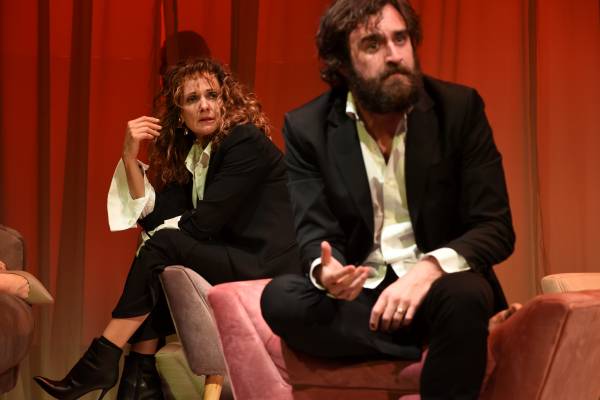The Playhouse, March 10, until April 7
4.5/10
Antony and Cleopatra is Shakespeare’s most opulent play in terms of both scale and language. Yet its challenging, operatic scope is also a graveyard for actors and directors. Unfortunately this production adds tombstones to that crowded cemetery for Evans (directing for Bell Shakespeare), Catherine McClements (Cleopatra) and Johnny Carr (Antony).
In his program notes Evans refers to the twin protagonists’ use of “hyperbolic” language to entertain each other, but he then allows McClements and Carr to reduce two of history’s titans to the level of a pair of suburban shire councillors having a tawdry, bickering affair. Where is the grandeur? Where is the thunderclap as a conflicted, compromised passion collides with the great sweep of geopolitics? Why is some of Shakespeare’s most sumptuous verse white-anted to no more than wooden recitation and distorted vowels?

Unlike the four great tragedies Anthony and Cleopatra is not concerned with its protagonists’ interior lives so much as how they see each other and the way the world sees them. To communicate this latter aspect Evans uses the highly effective device of having his cast become observers, just as a modern television audience watches the political fortunes and private lives of its public figures unravel. These bodies, draped languorously about the set like flotsam from an orgy, perfectly evoke the indulgent world of Cleopatra’s court, but why are they still there when the action moves to Rome? Surely the contrast should be maximised, even if the bodies now sit to attention?
McClements, who emphasises Cleopatra’s commonness and shrewishness at the expense of other qualities, also has moments so sublime as to suggest what might have been. When Antony announces his return to Rome, for example, and Cleopatra suddenly softens to deliver the heartbreaking speech that begins, “Courteous lord, one word…” and concludes “O, my oblivion is a very Antony, / and I am all forgotten”, McClements is riveting, exposing a vulnerability for which we are wholly unprepared. The queen’s chameleonic volte-face’s must be facets of the same credible whole, however, rather than a patchwork of disparate characters.
Carr’s Antony contains no germ of the hero that once was. The characterisation takes Philo’s opening assessment of him as “The triple pillar of the world transform’d / Into a strumpet’s fool” too literally, when, again, this should just be one aspect, and his bursts of epic verse are discarded as lightly as if the character’s wrapping paper. Furthermore Evans has this Antony and Cleopatra always knowing when they fool themselves, rather than sometimes believing their own myths and leaving the audience (and those draped about the stage) to guess the truth.
Gareth Reeves offers a much more successful realisation of Octavius, although even he can suffer from the widespread malaise of too much sound and fury signifying very little. A ruthless achiever, Octavius should be slow to anger, his voice less inclined to being raised than to steeliness. Two other actors who shine – at ease with the verse and convincing in their roles – are Lucy Goleby as a gender-swapped Pompey and Zindzi Okenyo as a Charmian/Iras composite.
Had Shakespeare set out to write a conventional tragedy he might well have centred the story on Enobarbus, and while Ray Chong Nee has his moments in the role, the fabled “The barge she sat in…” speech (describing Cleopatra’s splendour) is squandered, and somehow his demise leaves us oddly unmoved.
The production is well-served by Anna Cordingley’s soft-draped, circular (world-like) set and Benjamin Cisterne’s lighting, but the former’s costumes lack internal logic.